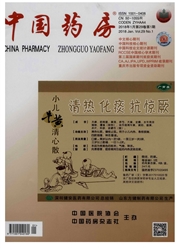

 中文摘要:
中文摘要:
目的:为完善全民“医保”和药品“零差率”销售等政策提供参考。方法:参考相关政策文件,分析目前全民“医保”和药品“零差率”政策存在的问题,并提出对策。结果:我国贫富差距较大,“医保”制度应根据不同经济水平人群分类设立。短期来看,医疗费用减免可减轻费用负担,但长远来看将推动医疗费用快速上涨,“医保”报销比例不宜快速提高,免费医疗更是不可取。医药分开、药品“零差率”销售政策短期内可降低药品费用,但从长期来看不能减轻人民群众药品费用负担。医药分开、药品“零差率”销售政策的出发点应当是解决医疗费用增长严控和药品产业大发展之间的矛盾,在控制医疗费用负担的同时,促进药品产业发展。落实前提是将医院原先获得的药品收益留在卫生系统。结论:可行的办法是成立药品招标配送中心,由该中心加价配送药品给各个医院,医院“零差率”销售药品。该中心加价所得药品收益纳入财政专项收入,并转拨卫生部门使用。
 英文摘要:
英文摘要:
OBJECTIVE: To provide reference for perfecting national "Medical Insurance" and "Zero-profit" drug sale policy. METHODS: Referring to related policies, the problems about existing systems were analyzed to put forward countermeasures. RESULTS: Because of the wide gap between the rich and the poor, medical insurance system should be established according to the population classification of different economic levels. In the short term, the reduction of medical fee can reduce the medical economic burden of residents, but in the long term medical economic burden of residents would grow rapidly. Medicare reimbursement should not be quickly increased to a higher level, and free health care was not desirable. The policies related to hospital-drug-separating and "Zero-profit" drug sale in hospitals can reduce drug costs in the short term, but in the long term they took no effects. The objectives of the policies of hospital-drug-separating and "Zero-profit" drug sale should be emphasized on solving the contradiction between controlling medical cost increase and developing pharmaceutical industry. It controlled medical cost, at the same time promoted the development of pharmaceutical industry. The implementation premise was to keep the benefit of drug in the health sec- tor. CONCLUSION: A feasible way is to set up a center of drug bidding and distribution which decides drug price and distributes drugs to various hospitals, and hospitals sale drugs in "Zero-profit". The fare got by center will be deposited into a special financial account, and should be transferred to health sectors.
 同期刊论文项目
同期刊论文项目
 同项目期刊论文
同项目期刊论文
 期刊信息
期刊信息
